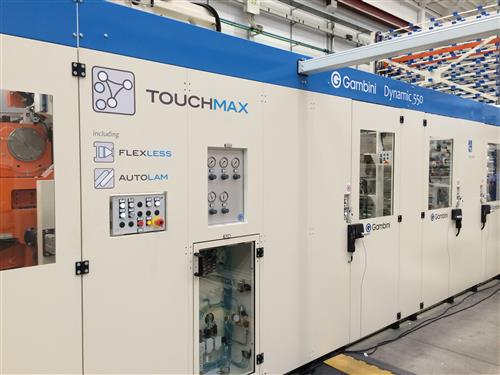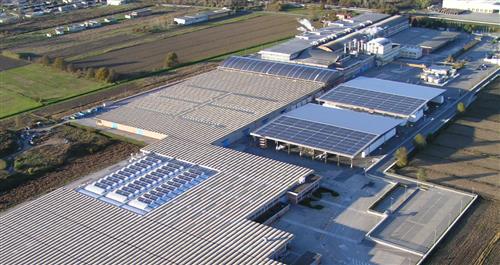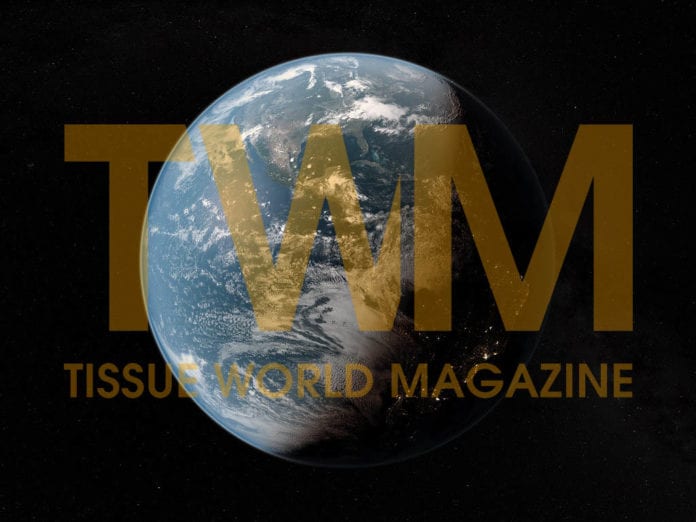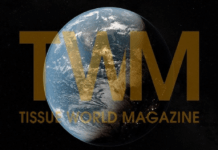POLAND
Almus boosts converting capacity
Poland’s Almus has boosted its converting capacity after it signed for a Gambini TouchMax line.
The family-run company is based in Slomniki and produces Almusso products, consumer and AfH products as well as private label tissue.
It has four Gambini converting lines including the N.4 Model Dynamic 550 line, which will be used to produce consumer products.
Due to the investment, Almus will offer products with the highest quality that also have cosmetic advantages.

The new line allows the company to produce rolls without tissue stretching in order to obtain high quality products without losing their original properties.
Gambini added that another advantage of the line is the lotioning, which means the machine can produce rolls with the best hygienic and cosmetic properties.
The line will also produce different patterns of each roll of kitchen towel, and consumers will never find two patterns the same.
Almus has already signed a contract for a new Gambini converting line for AfH products.
POLAND
GZP boosts capacity
Głuchołaskie Zakłady Papiernicze (GZP) has boosted its capacity after it signed up Hergen to supply a Smart Fit Crescent Former.
The Polish company produces a variety of tissue products across five machines located in two paper mills.
Its Niedomice mill’s PM1 will be rebuilt into a crescent former and Hergen’s scope of supply included approach flow engineering, crescent former HCF 920 Smart Fit, felt section, suction and blind drill press section, Yankee dryer columns, pope reel, a set of spare rolls, package of engineering and start up services.
The machine produces tissue with basis weight since 11g/m2 up to 28 g/m2 on the reel with excellent formation and mechanical properties.
Operating speed is 1,200m/min it designed to achieve capacity up to 80tpd.
GZP offers a full range of tissue products, including private labels.
The investment is part of a development plan to improve its products and energy savings.
SLOVAKIA
Slovakia’s Bukóza prepares for two new lines of personal care products
(News from RISI) – Bukóza Invest is taking another step in its entry into the hygiene products business.
The company started production on two lines at its facility in Hencovce in eastern Slovakia in August last year and is now getting ready to start up two more lines in the second half of this year.
The firm currently has a monthly capacity of some 3.5m pieces of sanitary napkins and some 3.4m pieces of incontinence pads.
Chief executive Erik Kadlec said: “This is our start-up capacity and we expect to increase it by 30% after making a few improvements and changes.”
The company is preparing to install two more lines which should be up and running in the second half of this year, doubling the firm’s capacity.
Both lines should have a monthly capacity of some 3.4m pieces, one producing ultrathin napkins and other pantyliners.
Last summer, Bukóza Invest announced that it would use some 20,000tpy of pulp from Bukocel’s nearby bleached hardwood kraft pulp mill to make products with higher added value, such as personal care products as well as powdered cellulose.
This would create 700 new jobs and the products should generate sales of some Euro 116 million.
However, to reach that level of new jobs, state support is needed, Kadlec said, adding that without support, the company can only create 150-200 new jobs.
The total investment would be some Euro 21.5m. Previously, the company was applying for Euro 10.75m in support for the project from the Slovak government, but this has been reduced to Euro 7.2m following new rules for state support.
There have been some delays on the funding side, however.
“The proposal was sent back from the government in order to verify certain points.
“We provided the required data and the project proposal has been sent back to the government for approval,” Kadlec said, adding that the company is now waiting for the government’s decision.
THE NETHERLANDS
Van Houtum to rebuild PM4
Independent hygienic paper producer Van Houtum is to boost its capacity after it signed up Toscotec to carry out a dry end rebuild of its PM4 tissue machine at its Netherlands-based Swalmen site.
Start-up of the machine at the family-owned company is scheduled for the third quarter of 2015.
The site produces 45,000tpy of tissue from recovered paper on two machines and a separate location nearby houses nine converting lines: three rewinders produce toilet and industrial products and six lines produce interfold and multifold products.
Toscotec’s delivery includes a new reel TT Reel-P that will replace the existing old one.
The project will be handled on a turnkey basis, including dismantling of the existing equipment, installation of the new machinery, start-up assistance and training services.
The new machine parts will be designed for an operative speed up to 1,800mpm with a paper width of 2,600mm.
ITALY
Sofidel starts up wastewater treatment plant at Delicarta
Sofidel has started up a wastewater treatment plant at its Delicarta Paper Mill in Italy.
The overall investment for the implementation of the project – which the company said is the first in the paper tissue sector – was €3m.
The technology used makes it possible to recover up to 75% of wastewater, saving 350,000m3 fresh water annually.

The process involves three phases: in the first phase the wastewater undergoes a biological process, in the second (for solid-liquid separation) it undergoes a ultrafiltration section, and the third and last phase aims to eliminating the remaining salt fraction, a process that consists of a reverse osmosis system.
The company’s technical partner is Degremont, with General Electric handling the MBR (Membrane Biological Reactor) aspect of the process.
FRANCE
SCA to build biological wastewater treatment plant at Kunheim mill in France
Sofidel has started up a wastewater treatment plant at its Delicarta Paper Mill in Italy.
The overall investment for the implementation of the project – which the company said is the first in the paper tissue sector – was €3m.
The technology used makes it possible to recover up to 75% of wastewater, saving 350,000m3 fresh water annually.
The process involves three phases: in the first phase the wastewater undergoes a biological process, in the second (for solid-liquid separation) it undergoes a ultrafiltration section, and the third and last phase aims to eliminating the remaining salt fraction, a process that consists of a reverse osmosis system.
The company’s technical partner is Degremont, with General Electric handling the MBR (Membrane Biological Reactor) aspect of the process.





























